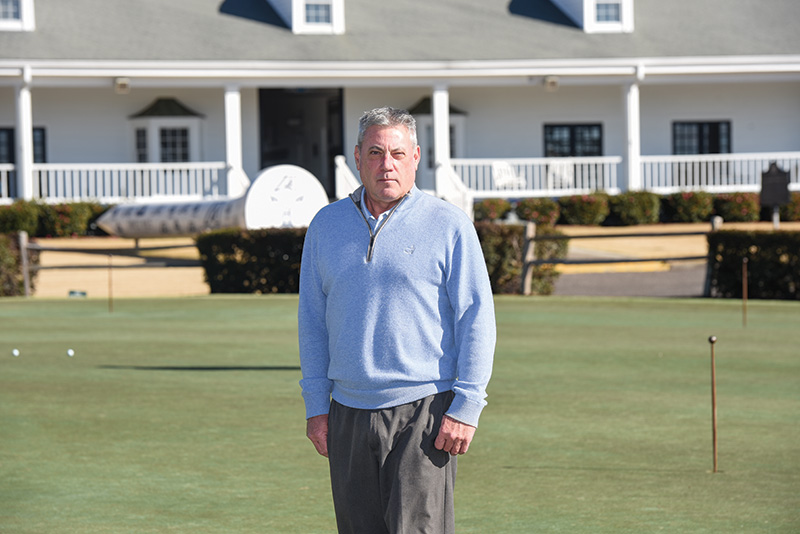
Brad Owen was a staple at Augusta National Golf Club in Augusta, Ga., overseeing the home of the Masters as its superintendent. Now, his journey has taken him to the team at Turfgrass. Photo by Barry Koenig
The living legend will be in the house at the Masters.
His house. In Augusta, Ga., schmoozing with guests and friends.
But please forgive Brad Owen if he allows his mind to wander from time to time as he welcomes people into his home near Augusta National Golf Club. After all, nobody in maintenance oversaw that special place longer than he did. Imagine all the memories that must be dancing in his head as the first major of the year begins while a new chapter in his life is off and running.
“While I won’t be thinking about it at night, I sure will be thinking about the daily movements to set up the course, what all the great staff will be going through, also just pray for great weather and everyone has a great time,” he says.
For the first time in decades, the Masters that starts April 10 will be one in which Owen will observe as a spectator. As the longest-tenured superintendent in Augusta National GC history, Owen retired from those hallowed grounds in 2024 following 38 years, including 27 as its director of golf course maintenance since 1997. In October 2024, Owen officially moved on, joining golf course consultancy firm Turfgrass in its U.S. division as he helps establish the business and its presence in North and Central America.
Turfgrass owner John Clarkin met Owen three years ago at the 150th British Open at St. Andrews.
Like-minded thinking made this match work.
“Turfgrass always thinks outside the box, and Brad has had to deal with this during his years leading the team at Augusta National,” Clarkin says. “It is a special place that keeps on producing high quality year after year. Turfgrass always strives for the best, even when circumstances like budget, etc., can get in the way. Brad’s lateral thinking made him a perfect fit for Turfgrass. There are always several ways to achieve higher standards on a golf course, even sometimes in the face of adversity.”
Owen made the decision to launch a new journey. “It was the right time to step aside, that I had done everything I could do there at Augusta National, and I also thought it was time to let the younger guys take the reins, if you will,” Owen says. “They surely had someone (Brent Seyer, now senior director of agronomy) more than qualified to be my replacement. It was time for me personally to be able to step away and do some things with my life and career and to work part time, do more with the men’s group at church, as well as do some personal traveling and maybe play some more bad golf.”
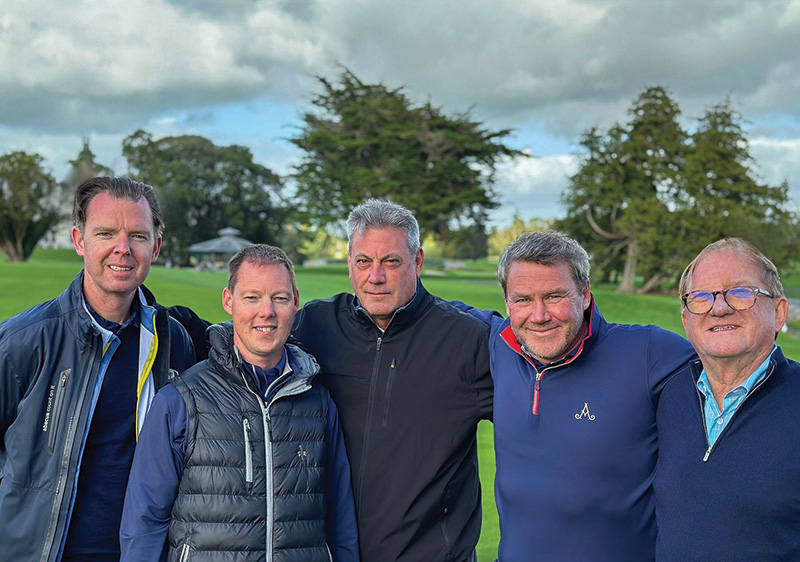
Owen and his new co-workers at Turfgrass. From left, Julian Mooney, Adam Moeller, Owen,
John Clarkin and John Lawrence. Photo courtesy of Turfgrass
The Carolina kid and the Augusta pipeline
William Bradford Owen III was born in Greensboro, N.C. His father, Bill, made a connection that would change his son’s life forever.
Elk River Club in Banner Elk, N.C., was building a new Jack Nicklaus Signature course in 1984 under superintendent Monty Melton. He was seeking summer workers, and Owen’s father suggested to Melton he had a candidate. Brad Owen spent two summers in construction for Melton. “The physical work outside was really the attraction,” says Owen, who was a student at Appalachian State. Meanwhile, Melton saw a superstar in the making with Owen.
“The thing I realized quickly was his initiative at 19 or 20. He took what he needed to get the job done right. He had a mind that was always thinking ahead. He was right in step with me or even a step ahead of me. He basically took it and ran with it,” says Melton.
Talk about getting the ball rolling: Melton helped set Owen’s future in motion. Melton wrote a letter to famed Penn State professor emeritus of turfgrass science Joseph M. Duich, Ph.D. Melton told Duich, “He’s that one-in-a-hundred individuals you’re looking for.”
It didn’t hurt that Melton was an assistant superintendent at Augusta National GC from 1975-1983 before he was at Elk River Club. Melton reached out to Augusta National GC superintendent Billy Fuller and shared with him all he had told Duich. “He (Owen, who ended up being schooled through Penn State) was thinking ahead. No down time, always motivating the crew. He took it and ran with it and brought everybody up,” Melton says. “Proud is a word that is used a lot. Not sure there is a better word to say. He was so good and so eager. His skill level, desire.”
In 1986, Owen joined Augusta National GC as an intern. Fuller only had Owen for less than a year. It was enough to make an assessment. “I think he was exceptional. He asked questions. He was always on time. He showed so much respect for everybody up and down the ladder,” says Fuller, who established Better Billy Bunker, “and had the intellectual part of it, too.”
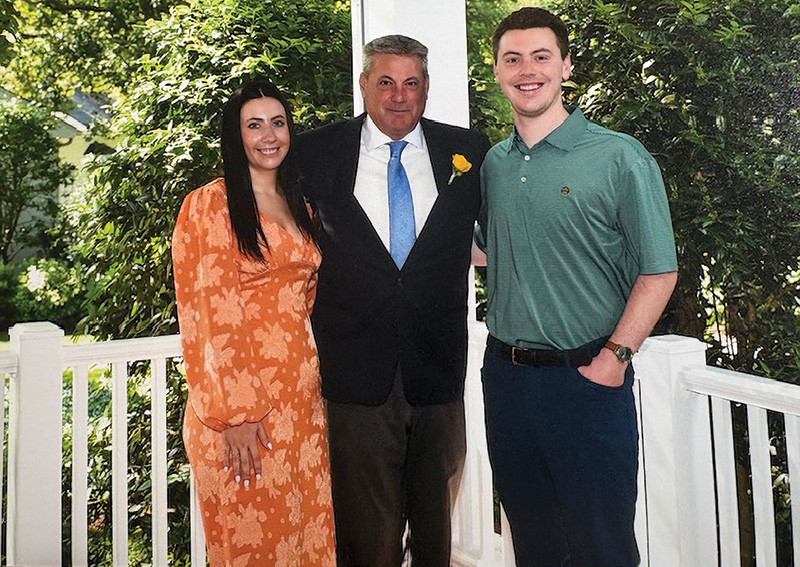
Owen (center) with his children, Kendall (left) and Will. Photo courtesy of Brad Owen
A slew of stars
The tree of superintendents in which Owen advanced is hall of fame stuff.
Besides Fuller, there was Paul R. Latshaw. Owen was an irrigation tech then as assistant. In Owen’s time under Latshaw, he went to Osaka, Japan, for a world horticulture fair. “He was very versatile. He could work. It was hard to get college-trained people,” Latshaw says, “and he did what it took. The prestige of that job and to do it for so long like he did … he had to be qualified and very professional.”
Marsh Benson took over in 1989 at Augusta National. Eight years later, Benson became senior director of golf course and grounds, and Owen was named superintendent. In 1998, Owen supervised his first Masters. He was pleased, but it wasn’t all about him. “I’m not one who really looks for those accolades and looks for the attention. I’d rather just as soon be behind the scenes and let the others that really support me get the credit,” says Owen, who credits his dad and mother, Deka, for how they raised him and impacted his work ethic. “It was surreal, no doubt. I won’t kid you at all, it was surreal. Having been there nine years and having Marsh having put a lot of responsibility on my shoulders, it wasn’t as big as a transition as one might think. That’s what we try to do there, with our people coming up through our system, and it put them in positions to have experiences so it’s not such a shellshocked moment when you move into that new position so you’re ready for it. And I’m just blessed that worked out that way.”
Benson, who departed in 2015, says Owen should take a bow. “He’s focused in and does what he says he will do. I would say it’s from his upbringing. He cares about people. Communicates. He really gets motivated by his desire to do work of significance, and obviously Augusta National provides that. He had a dual role of long-range planning. Being there that long, it says you were able to be put in a situation where you absorb and buy into the culture and gives you opportunities to grow and expand. Brad was great from the start. The job can be stressful. He has a good sense of humor. Get to know your people. He knew the people.
“I think the value he’ll bring to his clients in his new job will be very high. I see nothing but good times ahead. A great man. I think we learned from each other. That’s the way it should always be.”
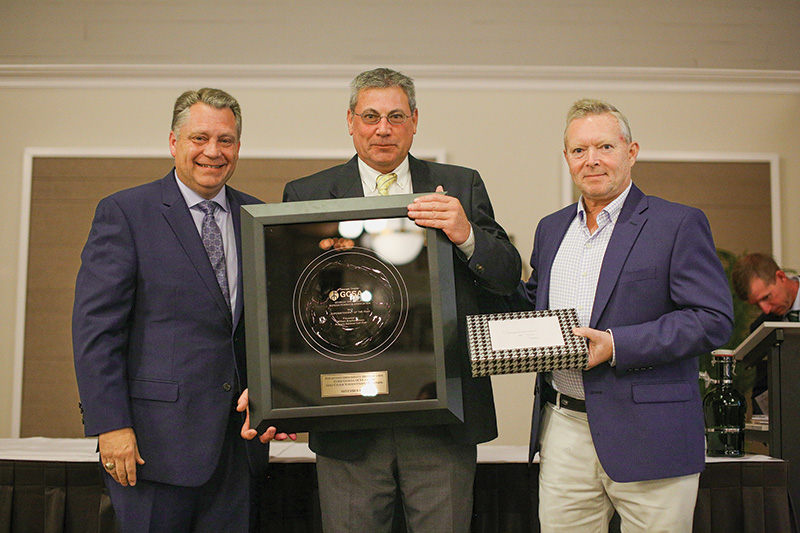
Owen received the Georgia GCSA Superintendent of the Year Award in 2020. Photo courtesy of Trent Bouts
Missing you?
Owen won’t miss those early wake-up calls at the club. In fact, he hasn’t had to do that for several years. Seyer assumed the job as superintendent Nov. 8 last year.
“Again, I was very blessed with a phenomenal staff that took a lot of that burden off of my shoulders,” says Owen, a GCSAA Class A superintendent and 39-year association member. “I cannot say enough about Brett and the staff at AN. He was with us for 14 years and had a couple of great assistants under him, and it’s not just one person. I was able to back away from that grind, if you will. They kept me sane for many, many years. I was blessed to have that situation. The membership at the National cannot be any better. They’re very grateful for the things that we did. Frankly, I could not have worked in a better environment in our industry, with the support from the chairman, from the leadership, the membership. It could not have been any better. It takes all that. So, I wasn’t burnt out to leave it for good, but, yes, it is nice not to get up first thing in the morn.”
Some of those who tried not to miss a thing under Owen still are better for it. Mitchell Eickhoff (Otter Creek Golf Course in Columbus, Ind.) and Lukus Harvey (director of agronomy at Atlanta Athletic Club) tell how they would be out doing their tasks and without warning turn around and see Owen behind them. “He walked the course, taking notes. I still do it today,” says Eickhoff, a GCSAA Class A superintendent and 11-year association member. “It’s his attention to detail. When something went wrong, he did a good job with the game plan, didn’t panic. Just very professional.”
Harvey made the most of his eight months as an intern from Ohio State. “His energy level was second to none, a relentless pursuit of perfection,” says Harvey, a 24-year association member. “It was the leeway he gave you. He allowed you to feel a sense of ownership and grow exponentially. I always said it was like getting my master’s from him.”
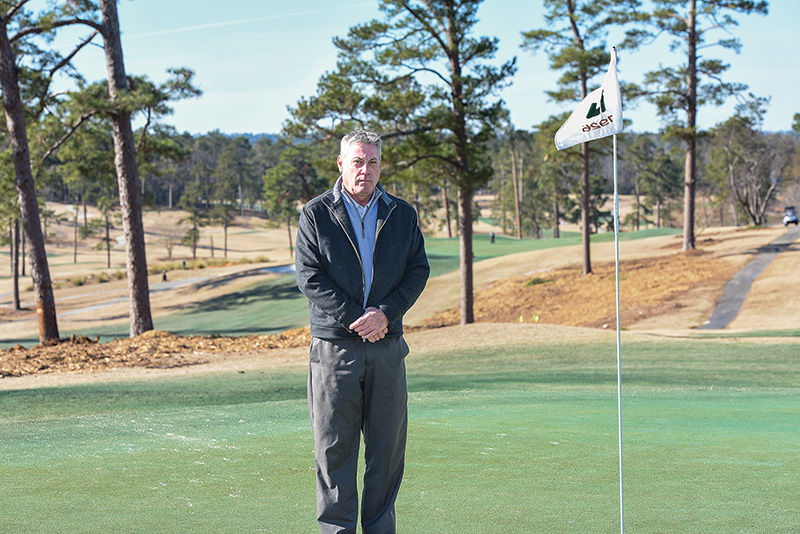
Owen says the decision to leave Augusta National was his, saying it was “time to step aside.” Photo by Barry Koenig
This and that
Owen’s epic story is intriguing. Here are some highlights:
November 2020 Masters delayed due to COVID-19: “Trying to produce tournament conditions was going to be a challenge,” he says. “We were going to give them everything we could. Unfortunately, Mother Nature had other ideas. It rained a tremendous amount during that time. I think it’s all something we’re going to always remember and feel like we’re better for having gone through that experience. It was very surreal with no patrons. Having said all that, we did identify the No. 1 player in the world at the time (Dustin Johnson). Anytime you can have the No. 1 player in the world win your tournament, you might be doing something right. I think it helped as a catalyst for the rest of the golf world to be able to start again, and if there’s anybody that can pull it off under extreme and unique circumstances, I think we were the ones to do that and are very grateful to be part of.”
Pressure: “Everybody will tell you, no matter whether it’s a muni course down the road, there is pressure. It takes a while to learn to deal with that, and you don’t do it by yourself. Again, it’s about having a lot of good support. It did take me a while to figure out that, kind of my philosophy to overall good health and a healthy lifestyle is to me a three-legged stool. I told employees this before, but I was able to get people to make me understand it’s about your physical health, your spiritual health and your mental health. And you need to have all three of those legs working together. If one falls short, the anxiety and the pressure can really get to you, so you’ve got to work at it every day, and that helped me to overcome, coupled with all the support. If you didn’t have weight on your shoulders, then you really didn’t care about it. You’ve got to have a passion, a passion about it.”
Setting the bar high at Augusta National: “It’s a search for excellence that we feel like that’s what (club founders) Bobby Jones and Clifford Roberts wanted us to be. And if we weren’t the best in anything and everything we did each year, we should continue to strive to be the best in what we do.”
During Owen’s final Masters last year, Masters Tournament Chairman Fred Ridley praised Owen, a past Georgia GCSA Superintendent of the Year. “As you may have seen the past few days, the Augusta National golf course and grounds are again in exceptional condition. This is a credit to every member of our agronomy and horticulture teams whose passion and dedication are unmatched,” Ridley said in a news conference. “It also is a tribute to Brad Owen, our senior director of agronomy who is retiring this fall. I want to thank him for always finding a way to elevate and enhance the natural beauty of Augusta National.”
Waffle House, dad, a hurricane and the long haul
What he did in his 20s is non-negotiable 40 years later in Owen’s world.
“In my early years, when I thought I was invincible, I might go to Waffle House and do a chili cheeseburger with some scrambled eggs. Later in life, you become a little bit wiser, some fruit and yogurt and a sausage biscuit every once in a while,” Owen says.
Owen, with one of his mentors, Marsh Benson, during their Augusta National GC days. Photo courtesy of Brad Owen
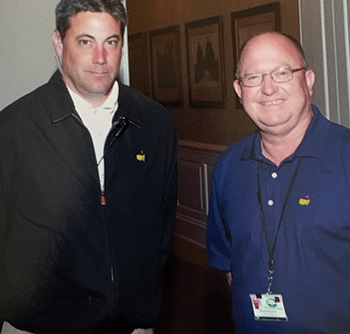
His world had good times, like when his father volunteered once. The sad times included when Hurricane Helene devastated Augusta’s community, including the course, last year. “I get a little emotional here,” says Owen, pausing as his voice softened. “The way our staff came together and the support of our membership and the contractors that helped us bring this place together I will always remember.”
As for being the longest-tenured superintendent in Augusta National history since it opened in 1934, Owen considers those who made it happen. “Well, it’s certainly special, not that I was shooting for the record books,” he says. “What it says is you have a lot of good folks around to support you. It says the membership and chairman believe in you. And you have a great staff. Nobody does that for that many years without the support you receive.”
Now, that support is focused on Turfgrass. They are all for him. “Brad has pretty much seen it all. ANGC is a household name. The person behind the last three decades carries the same weight. We are honored that Brad, who I am sure had several offers, chose to team up with Turfgrass,” Clarkin says. “He, along with John Lawrence and Adam Moeller, make a great team with Turfgrass USA. We make sure we keep him levelheaded, but, amazingly, with everything Brad has achieved to date, he is one of the humblest guys in the industry. It is a pleasure to work with Brad, and there is no price that you can put on what he has learned through his extraordinary career.”
And about that gathering at his place this month for the Masters — Owen, who turns 61 this month and is a father of two, may do something he never did there.
“I’ll probably go out a couple of days,” he says, “and have a cold beer for the first time with the patrons.”
Howard Richman (hrichman@gcsaa.org) is GCM’s associate editor.